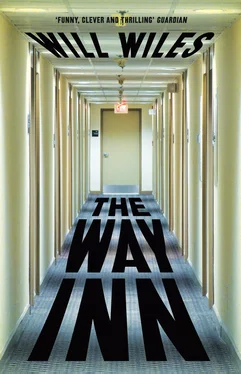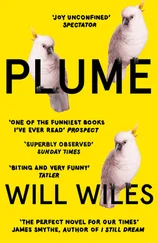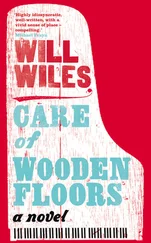Back in my room, housekeeping had not yet called, and the risen sun was doing little to cut through the atmospheric murk beyond the tinted windows. The unmade bed, the inert black slab of the television, the armchair with a shirt draped over it – these shapes seemed little more than sketched in the feeble light. Before dropping my keycard into the little wall-mounted slot, which would activate the lights and the rest of the room’s electronic comforts, I walked over to the window to look out. It wasn’t even possible to tell where the sun was. Shadowless damp sapped the colour from the near and obliterated the distant. The thick glass did nothing to help; instead it gave me a frisson of claustrophobia, of being sealed in. I looked at its frame, at all the complicated interlayers and the seals and spacers holding the thick panes in place: high-performance glass, insulating against sound and temperature, allowing the hotel to set its own perfect microclimate in each room.
A last look as I recrossed the small space – the brightest point in the room was the red digital display of the radio-alarm on the bedside table. I slid the card in the slot and the room came alive. Bulbs in clever recesses and behind earth-tone shades. Stock tickers streamed across the TV screen. In the bathroom, the ascending whirr of a fan. I brushed my teeth, stepping away from the sink to look at the painting over the desk, the only example of the hotel’s factory-made art in my room. The paintings in the bar had seemed so threatening last night – remembering the moment, the threat had come not from what lay within their frames but from the possibility of what lay outside them.
You have to look at the bigger picture, she said – and she meant it literally. If the paintings were simply scraps of a single giant canvas, they could be reassembled. And if they were reassembled, what picture formed? We were being fed, morsel by morsel, a grand design. ‘A representation of spatial relationships’ was how she described it. Her work, she said, involved sensing patterns in space – finding sites that were special confluences of abstract qualities, where the curving lines of a variety of economic, geographic and demographic variables converged. A kind of modern geomancy, a matter of instinct as much as calculation. She had a particular gift for seeing these patterns, any patterns. And the paintings formed a pattern. She was certain.
After midnight and after whisky, the idea found some traction with me. But in the morning, with the lights on, it sounded absurd. The artwork before me was simply banal, and I could not see that multiplying it would do anything but compound its banality. A chocolate-coloured mass filled the lower part of the frame, with an echoing, paler – let’s say latte – band around it or behind it, and a smaller, mocha arc to the upper left. Assigning astral significance to such a mundane composition was, frankly, more than simply eccentric, it was deranged. She had spent too long looking for auspicious sites and meaningful intersections for hotels, and was applying her divination to areas where it did not apply. I tried to trace the lines of the painting beyond the frame, to imagine where they might go next, extrapolating from what I could see. Spheres. Conjoined spheres. Nothing more. Spatial relationships – what did that even mean?
Spit, rinse. Bag, credentials, keycard. The shadows returned and I closed the door on them.
Music while waiting for the lift: easy-listening ‘Brown Sugar’. The lift doors were flanked by narrow full-length mirrors. Vanity mirrors, installed so people spend absent minutes checking their hair and don’t become impatient before the lift arrives. Mirrors designed to eat up time – there was some dark artistry, it’s true, but a decorators’ trick, not a cabalistic conspiracy. A small sofa sat in the corridor near the lift, one of those baffling gestures towards domesticity made by hotels. It was not there to be sat in – it was there to make the corridor appear furnished, an insurance policy against bleakness and emptiness.
In fact, given that this was a new hotel, it was possible, even likely, that no one had ever sat in it. An urge to be the first gripped me, but the lift arrived. Several people were already in it, blocking my view of infinity.
The first time I saw a hotel lobby, it was empty. Not completely empty, in retrospect: there were three or four other people there, a few suited gentlemen reading newspapers and an elderly couple drinking tea. And the hotel staff, and my father and mother. But my overriding impression was plush emptiness. Tall leather wing-back armchairs, deep leather sofas riveted with buttons that turned their surfaces into bulging grids. Lamps like golden columns, ashtrays like geologic formations, a carpet so thick that we moved silently, like ghosts.
Who was this fine place for? Surely not for me, a boy of six or seven – it had been built and furnished for more important and older beings. But where were they? When did they all appear?
‘Who stays in hotels?’ I asked my father.
‘Businessmen,’ my father said. ‘And travellers. Holidaymakers. People on honeymoon.’ He smiled at my mother, a complex smile broadcasting on grown-up frequencies I could detect but not yet decode. My mother did not smile back.
A waiter had appeared, without a sound. My father turned back to me, his smile once more plain and genial, eager to please his boy. ‘What would you like to drink?’
‘What is there?’
‘Anything you like.’
‘Coca Cola?’ I said, unable to fully believe that such a cornucopia could exist, that I could order any drink at all and it would be delivered to me.
Mother straightened like a gate clanging shut. ‘We mustn’t go off our heads with treats. How much will this cost?’ The question went to the waiter but her eyes were on me and my father, warning.
‘Darling, the company will pay.’
‘Will they? Do they know it’s for him? Is that allowed?’
‘They won’t know, and if they did, they wouldn’t mind. It’s just expenses.’
Expenses – another word freighted with adult mystery. Expenses, I knew, meant something for nothing, treats without consequences, the realm of my father; a sharp contrast to the world of home, which was all consequences. And expenses meant conflict, but not this time.
My father sold car parts, but he never called them car parts – they were always auto parts. Later, I learned specifics: he worked for a wholesaler and oversaw the supply of parts to distributors. This meant continual travel, touring retailers around the country. He was away from home three out of four nights, and at times for whole weeks. I yearned for the days he was home. We would go to the park, or go swimming – nothing I did not do with my mother, but the experience was transformed. He brought an anarchic air of possibility to the slightest excursion. A gleam in his eye was enough to fill me with mad joy. It was life as it could be lived, not as it was lived.
This was, in my father’s words, ‘a proper hotel’ – plush and slightly stuffy; English, not American; not part of a chain. It was in a seaside resort town, far enough from home for the company to pay for a room, but close enough for me and my mother to join him for a brief holiday, a desperate experiment in combining his peripatetic career with home and child-rearing. A fun and, much more important, normal time would be enjoyed by all – such was my mother’s anxiety on these points that she successfully robbed herself of any enjoyment. The hotel was quiet because it was off season. Winter coats were needed for walks along the grey beach; the paint was bright on the signs above the metal shutters, though the neon stayed unlit. The town was asleep, and we were intruders. In the hotel, we dined quietly among empty tables, an armoury of cutlery glinting unused, table linen like snow undisturbed by footsteps. I roamed the corridors. The ballroom was deserted and smelled of floor-polish. The banqueting hall was a forest of upturned chairs on tables. Everything was waiting for others to arrive, but who, and when? What happened here was of great importance and considerable splendour, but it happened at other times, and to unknown persons. Not to me.
Читать дальше












